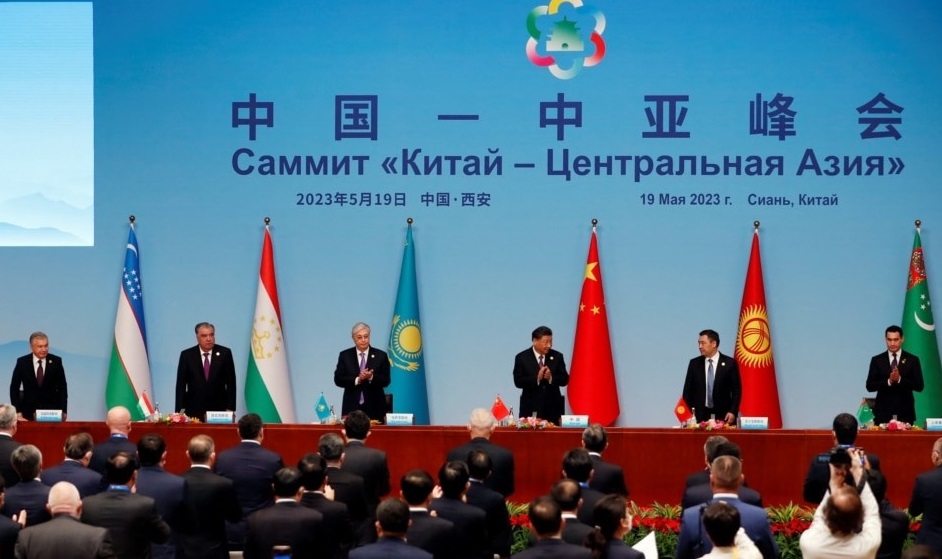The Xi'an summit and Beijing's new routes
The meeting of the Central Asian countries with Xi Jinping should not only be read as a counterbalance to the G7. Kazakhstan, Uzbekistan, Kyrgyzstan, Tajikistan and Turkmenistan used to be Moscow's 'backyard'. Today, they not only de-Russify linguistically and socially, but welcome China's big brother with open arms.
Xi'an (AsiaNews/Agencies) - The China-Central Asia Summit held in Xi'an on 19-20 May, at the same time as the G-7 Summit in Hiroshima, seemed not so much a counterbalance to the greats of the West gathered in the Far East, but a warning and a completion: we are here too, from now on the world will be divided into equal parts. Xi Jinping's China has extolled the 'quiet force', a force, moreover, of enormous dimensions, which does not want to make war, but without which peace cannot be made.
The Xi'an meeting thus seemed to echo the splendours of the distant past, when the Great Kurultay of Karakorum met in the early 13th century, when the 'ruler of the oceans' Genghis Khan brought together the Turkic peoples with the Mongolian peoples to form the largest empire in all of human history.
The Tartar Horde then invaded and completely destroyed Kievan Rus', and between the two great summits of world powers today, the only one left out was Putin's Russia, with the shame of Zelenskyj's Ukraine in Japan.
The summits certainly do not exhaust the list of great countries: in addition to Russia, the rogue state par excellence, there are the equally isolated Persians of Iran, but also the middle kingdoms of Turkey, the Persian Gulf and India and many others, in any case obliged to re-position themselves in the new world order.
Without exaggerated tones, China has thus succeeded in effectively sanctioning Russia's exclusion from political and trade routes, demonstrating that its growing influence in Central Asia frees it from the geographical limits of the East, bringing it increasingly to the centre of the world. The five former Soviet countries used to be Moscow's 'backyard', and today they are not only de-Russianising linguistically and socially, but welcoming Beijing's big brother with open arms.
In Xi'an, there was no talk of wars or alliances, which remained in the background, but infrastructure and trade were discussed. China promised almost four billion dollars in new investments, on top of the many already paid, effectively buying up the whole Asian area from its Soviet past; behind the scenes of the stage, the Siberian regions of the Russian Federation could be glimpsed, very interested in the outcome of the negotiations.
However, it would be niave to believe that Beijing is completely leaving security to the Russians, concentrating only on business: the agreements also spoke of defence and increased military expenditure.
As many observers point out, the summit is merely an outcome of years in which Russia has gradually ceded economic control of Central Asia to China. In the 31 years since the end of the USSR, this is the first time that the presidents of this Asian G-6 have all met together, but the entanglements between China, Kazakhstan, Uzbekistan, Kyrgyzstan, Tajikistan, and Turkmenistan are now so dense as to make the meeting almost inevitable and celebratory.
Russia is now the 'back yard' of the new Asian empire: it will not be destroyed as in the days of the Khans, but will become a loyal vassal, albeit with its own Western turmoil. The five leaders of the 'Stan-countries' arrived in Xi'an directly from the Victory Parade on Moscow's Red Square, where they had consoled Putin in his solitude, being no longer servants, but lords.
The Russian war in Ukraine has thus turned into an extraordinary opportunity for China and its allies, distracting Moscow from its former Asian domains and "offering it spaces and possibilities never seen before", as the director of the China programme of the Stimson Centre for Analysis in Washington, Yuan Sun, puts it.
Meanwhile, the Asian G-6 countries are the main suppliers for Russia of computer microchips, laser equipment and various other items of civil and military importance, now inaccessible due to sanctions from the West, but today more vital than bread, in order not to fall into a kind of technological Dark Ages.
In the meantime, the Kazakh Tokaev opens the doors wide to Chinese companies, whose representatives will no longer even need an entry visa, and thanks Beijing 'for supporting the sovereignty of the Central Asian countries'. Uzbekistan and Kyrgyzstan have signed an agreement with Beijing to complete the railway line that will connect the East to the West, no longer passing through Russia. The 'Silk Road' is also outdated and reintegrated into a new and great Central Asian route, the beating heart of the future world.







.png)










